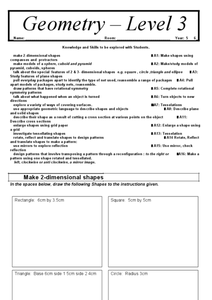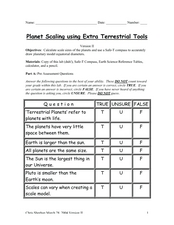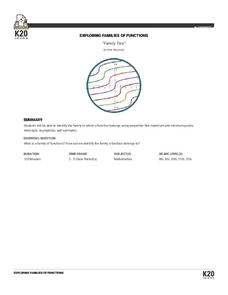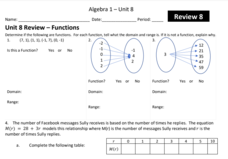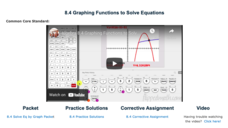Curated OER
Geometry Level 3
What a wonderful resource! Learners create two-dimensional shapes according to the instructions stated, use the squares to make a triangular prism, a cube, and a pyramid, and identify features of plane shapes, among a myriad of other...
New York Science Teacher
Planet Scaling using Extra Terrestrial Tools
Your class will use a set scale to convert diameters of planets to the model size, the diagram given to expand on the number of planets drawn as concentric circles, and examine the scale that would be needed to fit the larger planets on...
K20 LEARN
Family Ties: Exploring Families OF Functions
They say it runs in the family. Small groups use a card sorting activity to group graphs of functions into families. After grouping by families, the class develops conclusions for parent functions and create a graphic organizer.
K20 LEARN
Are We Golden?
Lead your class on a search for precious bones. Using a presentation, the class investigates the golden ratio in art and nature. Groups of pupils measure specific bones and find the average ratio for the class. To further cement the...
Flipped Math
Unit 9 Review: Area of Polygons
It's time to show what you know! Individuals first review finding the area of polygons using the formulas from parallelograms to regular polygons. They then brush up on finding the area and circumference of circles, as well as reviewing...
Flipped Math
Sectors and Segments
It's a piece of pizza! Pupils learn about a sector of a circle as a slice of the circle and determine how to find its area. Scholars continue to find out how to calculate the segment of a circle based on the sector's area. At the end,...
Flipped Math
Circles and Arc Lengths
Discuss all things round and round. Pupils review finding area and the circumference of circles and use them to solve problems. Next, they learn about central angles and their relationships to measures of arcs. Learners then find out how...
Flipped Math
Parallelograms and Triangles
Expand area problems to incorporate prior knowledge. Pupils begin by reviewing the formulas for finding the area of parallelograms and triangles. The scholars apply previous learning of trigonometric ratios and the Pythagorean Theorem to...
Flipped Math
Equations of Lines in the Coordinate Plane
What, you mean there is algebra in a Geometry class? Pupils review graphing and writing the equations of lines in slope-intercept form. The instruction follows the "I do, we do, you do" framework of a lesson. The instructor first...
Flipped Math
Measuring Angles
An informative presentation shows pupils how to name and measure angles. Scholars revisit the different types of angles and their definitions and use their knowledge of what an angle bisector is to solve algebraic problems. At the end,...
Flipped Math
Unit 5 Review: Systems of Equations
Activate transformers along with algebra systems. Pupils use 10 problems to review transformations of functions to solve a variety of systems of equations. Individuals identify the types of transformations from an equation along with...
Utah Education Network (UEN)
Expressions and Equations
Variables may be unknown, but expressions and equations are easy to understand. Pupils learn to write, evaluate, and simplify numeric and algebraic expressions. They also investigate how to write and solve simple equations and...
Utah Education Network (UEN)
Geometry
Shape one's understanding of geometry using the resource. The sixth of seven chapters in 6th Grade Math focuses on geometry principles. Future mathematicians learn to find the area of parallelograms, trapezoids, triangles, and other...
Utah Education Network (UEN)
Statistics
Find the value in analyzing data values. Statistics is the focus in the fifth of seven installments of the 6th Grade Math series. Individuals learn to examine dot plots, histograms, and box plots by considering the shape, mean, median,...
Utah Education Network (UEN)
Extending the Number System
Don't feel negative about negative numbers. Individuals extend their knowledge of positive numbers and fractions to rational numbers. They see how to represent negative rational numbers on a number line, learn about opposites and...
Utah Education Network (UEN)
Percent, Division with Fractions, and Measurement Conversion
The resource will be 100 percent beneficial. The third of seven installments in 6th Grade Math starts with lessons on percent and percent problems. Pupils also learn how to divide fractions and apply ratio reasoning to convert units,...
Utah Education Network (UEN)
Ratio Relations
At this rate, the class will be experts on ratios and rates in no time. A class workbook teaches individuals about ratio language, using tables and tape diagrams to find equivalent ratios, and solving ratio problems. They then discover...
Flipped Math
Unit 10 Review: Quadratics
Everything one wanted to know about parabolas in one place. Pupils work 27 problems as a review of the unit on quadratics. Problems range from determining key features of the function and using that information to graph the parabola, to...
Flipped Math
Modeling with Quadratics
Do some interpretive modeling. Class members watch three examples of interpreting key features of a graph of a quadratic to find solutions to a real-world problem. Learners review how to find the key features on a graph using technology...
Flipped Math
Unit 8 Review: Functions
Let's finish a functional review. Pupils work through 31 items to review the concepts learned in Unit 8. Scholars determine whether a mapping is a function and identify the domain and range. Using function notation, individuals then...
Flipped Math
Graphing Functions to Solve Equations
Intersections become solutions. Scholars watch a video on using a graphing calculator to find the solution to an equation in one variable. While watching the presentation, pupils practice working some of the examples and compare their...
Teach Engineering
Powering a Device Using Food
Eat up a resource on using food to power electrical devices. Future engineers first experiment with different fruits and vegetables to determine the amount of electrical energy they provide. Based on the data, they design and create an...
US Department of Commerce
Let's Count!
Counting objects is easy as one, two, three. Young mathematicians count objects in the classroom and create data tables to record their results. They then write comparison statements and answer questions about the data.
US Department of Commerce
Changes in My State
So much can change in seven years. Young statisticians choose three types of businesses, such as toy stores and amusement parks, and use census data to determine how the number of those businesses in their state changed between 2010 to...


